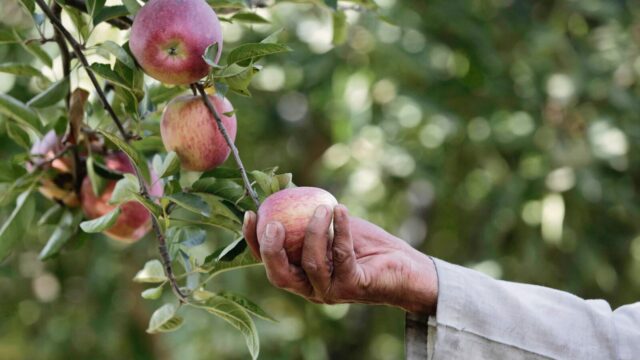Mint reported on Monday that the finance ministry has notified 13 new commodities for derivatives trading so that businesses (whether companies or farmers), producers and consumers can better manage price risks. The new commodities include farm products such as apples, cashews, garlic, skimmed milk powder, white butter, timber and bamboo.
Mint reported on Monday that the finance ministry has notified 13 new commodities for derivatives trading so that businesses (whether companies or farmers), producers and consumers can better manage price risks. The new commodities include farm products such as apples, cashews, garlic, skimmed milk powder, white butter, timber and bamboo.
India launched derivatives trading in agricultural commodities more than two decades ago but frequent suspensions and bans imposed by governments have prevented farmers from benefiting from this important risk-mitigation tool.
Premium benefits
35+ Premium articles every day
Specially curated Newsletters every day
Access to 15+ Print edition articles every day
Subscriber only webinar by specialist journalists
E Paper, Archives, select The Wall Street Journal & The Economist articles
Access to Subscriber only specials : Infographics I Podcasts
Unlock 35+ well researched
premium articles every day
Access to global insights with
100+ exclusive articles from
international publications
Get complimentary access to
3+ investment based apps
TRENDLYNE
Get One Month GuruQ plan at Rs 1
FINOLOGY
Free finology subscription for 1 month.
SMALLCASE
20% off on all smallcases
5+ subscriber only newsletters
specially curated by the experts
Free access to e-paper and
WhatsApp updates
India launched derivatives trading in agricultural commodities more than two decades ago but frequent suspensions and bans imposed by governments have prevented farmers from benefiting from this important risk-mitigation tool.
In August 2021, derivatives trading in chana was suspended. In October 2021, trading was suspended for mustard, non-Basmati paddy, wheat, soya bean and its derivatives, crude palm oil, and moong dal.
The government’s go-ahead for derivatives trading in apples and other agri products could be a great move for improving price discovery in markets for farmers’ produce – provided it isn’t disrupted by suspensions and bans.
It will help encourage more farmers to move away from minimum support price (MSP) crops. MSP crops don’t fetch great prices in markets, as production exceeds consumption demand in most years. The latest monthly consumption expenditure estimates for households show that even rural Indians are consuming less of these crops.
Without the support of subsidies and MSPs, which impose heavy costs on the budgets of the central government and state governments and divert tax money from development heads, the production of these crops isn’t remunerative or globally competitive.
Small farmers, which constitute 86% of agricultural households, prefer to produce these crops as the government’s procurement at MSPs and subsidies assure them returns. That’s because small producers typically find it hard to access markets, have little bargaining power, and inadequate storage facilities for perishable produce, all which make it nearly impossible for them to contend with price uncertainties. It’s impossible for small farmers to assess, at the time of sowing, what market prices their produce will command. That’s why they look to sell to the government at assured prices. A well-functioning derivatives market could help them adopt a forward-looking approach instead of relying on signals from the government’s MSPs.
If small farmers’ capacity for risk-taking could be improved, the chances of them shifting to high-value crops that fetch better prices would improve. This would improve their incomes, better align their produce with consumption baskets, and free up budgetary resources for development.
One way to help improve farmers’ risk appetite is to improve the functioning of markets to make price discovery better and fluctuations foreseeable. A well-functioning derivatives market is a great way to do this. Derivatives trading helps improve the availability of information about market demand, which is necessary for mitigating price and production risks. It could go a long way in addressing farmers’ concerns and encourage them to try producing non-MSP crops.
According to the government’s Situation Assessment Survey, farming households earn from livestock and horticulture have much higher average incomes than those that earn only from agriculture, even though no MSPs are announced for livestock, fruits, vegetables and horticulture products, and the government does not procure most of these goods. Poultry is one the fastest-growing segments in Indian agriculture, followed by fisheries, which also contributes significantly to the incomes of families engaged in it. There are huge export markets, for instance in West Asia, that could be tapped for livestock, fisheries and horticulture products. These are currently being served by Europe.
If India is to become a developed country by 2047, per-capita income will have to rise from about $2,500 to more than $21,664 by 2047, according to a paper published in the Reserve Bank of India’s July 2023 bulletin. As more than 45% of India’s working population is engaged in farm work, according to government data, one thing is clear – India’s per-capita income won’t increase substantially if farmers’ incomes don’t rise.
It’s also clear that the current policies – subsidies for fertilisers and power, and MSPs – can’t improve farmers’ incomes. The budget outlays simply won’t be sufficient.
Their incomes could improve, however, if they were to shift to high-value crops. For this, they will have to identify deep-pocket consumption markets, and find ways to serve them. Derivatives trading helps with this.
Once the Open Network for Digital Commerce (ONDC) becomes fully functional, farmers will be able to sell their produce directly to buyers, which will also reduce market imperfections. Along with derivatives trading, it should help farmers drop their reliance on government subsidies for demand-driven farming. The open e-commerce platform is expected to reduce barriers to entry for small farmers, help them reach markets faster, and ensure fair prices for their produce.




